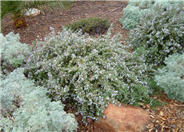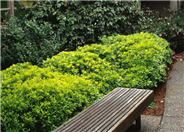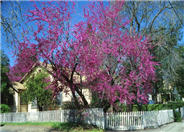
Common name:Prostrate Rosemary
Botanical name:Rosmarinus officinalis 'Prostratus'
The 'Prostratus' grows to a height of 2'-3' with a spread to 8'. Its flowers are pale, lavender-blue in color, and the leaves are needle-like with a dark, blue-green color. This plant makes a good ground cover, and its leaves can be used as seasoning in cooking. Bloomtime is winter and spring, but also intermittently throughout the year. This ground cover like full sun and well draining soil. It is drought tolerant once it's established.

Common name:Wheeler's Dwarf Pittosporum
Botanical name:Pittosporum tobira 'Wheeler's Dwarf'
This handsome dwarf form of the Pittosporum tobira grows into a low, dense mound, 2'-3' tall and 4'-5' wide. This shrub is covered with glossy, evergreen foliage. Small, fragrant, white flowers cover this shrub in spring. It prefers full to part sun and is drought tolerant once its established. Give extra water in summer. Wheeler's Dwarf is dependable and easy to grow. Prune in winter to keep shape.

Common name:Eastern Redbud
Botanical name:Cercis canadensis
This small, deciduous tree with a rounded head is covered with small flowers of a rose pink color in the spring before the appearance of heart-shaped leaves. It can grow to 25' tall with an equal spread. It has a low branching habit with a rounded form. During fall, foliage turns yellow. Eastern Redbud lives about 20 years. This is a great patio tree or for a small front yard.
If you mulch heavily as recommended in the compost and mulch fact sheets you should not need traditional fertilization. Sustainable landscapes fertilize themselves as soil organisms break down and recycle the dropped leaves into nutrients.
Click in the green box for more information
Designer:
Photographer: GardenSoft
Maintain a two to four inch layer of mulch on the soil surface to reduce weeds, infiltrate rain water, and reduce compaction.
Drip and other smart irrigation delivers water directly to roots, allowing no excess water for weeds.